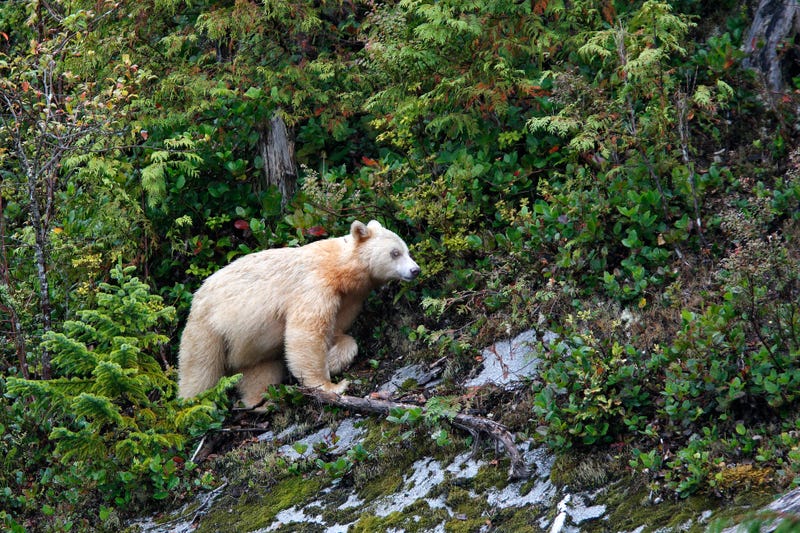
(WWJ) - Officials in Michigan confirmed a stunningly rare black bear with white-colored fur – also called a “spirit bear” – is wandering the woods in the western regions of the Upper Peninsula.
It is the state's first ever sighting of the extremely rare animal, which was captured on a resident's trail camera in early September, MLive reported.
Michigan's spirit bear is estimated to weigh about 100 lbs. and sports a blonde-colored coat with streaks of red or cinnamon coloring on the back of its head and down the neck.
According to the nonprofit North American Bear Center, most spirit bears, known as Kermode bears, make their home on Princess Royal and Gribbell Islands along the coast of British Columbia where the genetic pool is smaller and isolated from other black bears -- all of this creates a higher chance of cubs being born with white fur.
Genetically, it makes the animal seen in Michigan a "one-in-a-million" bear, researcher Lynn Rogers of the Wildlife Research Institute in Minnesota told Mlive.
“So, there are a few genes in this area,” he said. “It’s a double-recessive gene. And if there are fewer of those genes here, it’s going to be rare that you get a double-recessive combination.”
This means both parents must carry the recessive gene for their cubs to be born with white or blonde fur, Rogers explained.
Michigan's spirit bear is only the fifth time a white black bear has ever been seen outside of their Canadian territory.
Cody Norton, wildlife biologist and large carnivore expert for the Michigan Department of Natural Resources, called the discovery exciting and provides an opportunity for officials to study the subspecies.
“So very cool. Very beautiful animal,” Norton said to Mlive. "Obviously, I’d love to actually see it."
At this time, the state does not have any legal protections against hunting spirit bears, like there is in British Colombia. Michigan's bear hunting season varies by area but the Upper Peninsula saw its season start Sept. 12 and runs through Oct. 26, the DNR said.
"If it did get harvested, we’d love to take a genetic sample and get to see if this is the same exact genetic mutation that is what is found in British Columbia in the remote bear population or if it’s something different,” Norton said.
“But then also of course, if it makes it through the season, it’d be great to see future trail camera photos and anything else to try to learn about it because it is super cool, super unique.”
Norton said the bear is not an albino, as it has coloration to its nose and skin.
The U.P. resident who owns camera told Mlive he originally did not believe the animal captured on film was a spirit bear. The man, who wishes to remain anonymous, thought the flash of the trail cam had washed out the image and lightened the black bear's fur -- he even deleted a couple of the photos on his computer before realizing it was not an equipment error.
“Well, the next day, it was like five o’clock and I’m still getting pictures from this bait. And I look and I’m like, ‘Oh my God. Look at this thing,'" he added.
